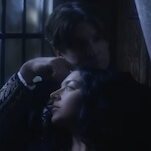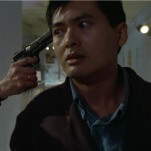L'Atalante

After completing his 1934 masterpiece L'Atalante, French director Jean Vigo died of tuberculosis at 29, leaving only three shorts and one feature to his name–not enough footage to fill up an afternoon, let alone a career. Some critics refer to him as, minute-for-minute, the greatest filmmaker who ever lived, but the title seems too heavy in light of Vigo's buoyant sensibility, which was touched by sly mischief-making, delicate avant-garde touches, and a poetic vision of everyday life. As the liner notes to the luminous new L'Atalante DVD explain, Vigo's cinematic pranksterism was ahead of its time: Made after his classic short Zero For Conduct was banned for promoting anarchy, the film was butchered by producers and nearly lost to history, until the full version was miraculously discovered and restored in 1990. Seen today, the film looks like the French New Wave as seen through a crystal ball, presaging an era of lithe, free-spirited experimentation that would arrive almost three decades later. But for all its innovation, L'Atalante remains at heart an extraordinarily perceptive chronicle of married life, when a couple's honeymoon dreams yield to a far more complicated reality, marked as much by bickering and resentment as youthful passion and love. In the mesmerizing opening scene, newlyweds Jean Dasté and Dita Parlo march purposefully toward his river barge in their wedding clothes, taking her away from the isolated village where she grew up. Clearly hoping to embark on new adventures and see the world, Parlo soon finds that life on Dasté's dingy ship is less glamorous than she'd ever imagined, with long workdays, cramped spaces, and coarse sailors like Michel Simon, whose salty exuberance makes a poor first impression. When her moody husband reneges on his promise to show her the City Of Lights, Parlo slips away on her own and returns to find that her broken-hearted captain has left port without her. Though an early talkie, L'Atalante resonates (at least in memory) as the last great silent movie, because so many of the film's most indelible moments have no dialogue, just the enchanting sound-and-image provided by musician Maurice Jaubert and famed cinematographer Boris Kaufman (On The Waterfront). The results are often magical: an erotic love scene created entirely by the superimposed longing of man and woman on separate beds, Dasté seeing a shimmering vision of his true love underwater, and Parlo's daydream fantasies of Paris, which don't come close to the real thing. Touted as a "collector's edition," the DVD features a slapped-together 20-minute documentary with only two talking heads (Columbia professor Annette Insdorf and film historian Bernard Eisenschitz) and a few other disposable supplements. But for even a casual cinephile, it's essential, a window into a precocious yet maturing talent whose early death left his ultimate potential a matter of tantalizing speculation.







































